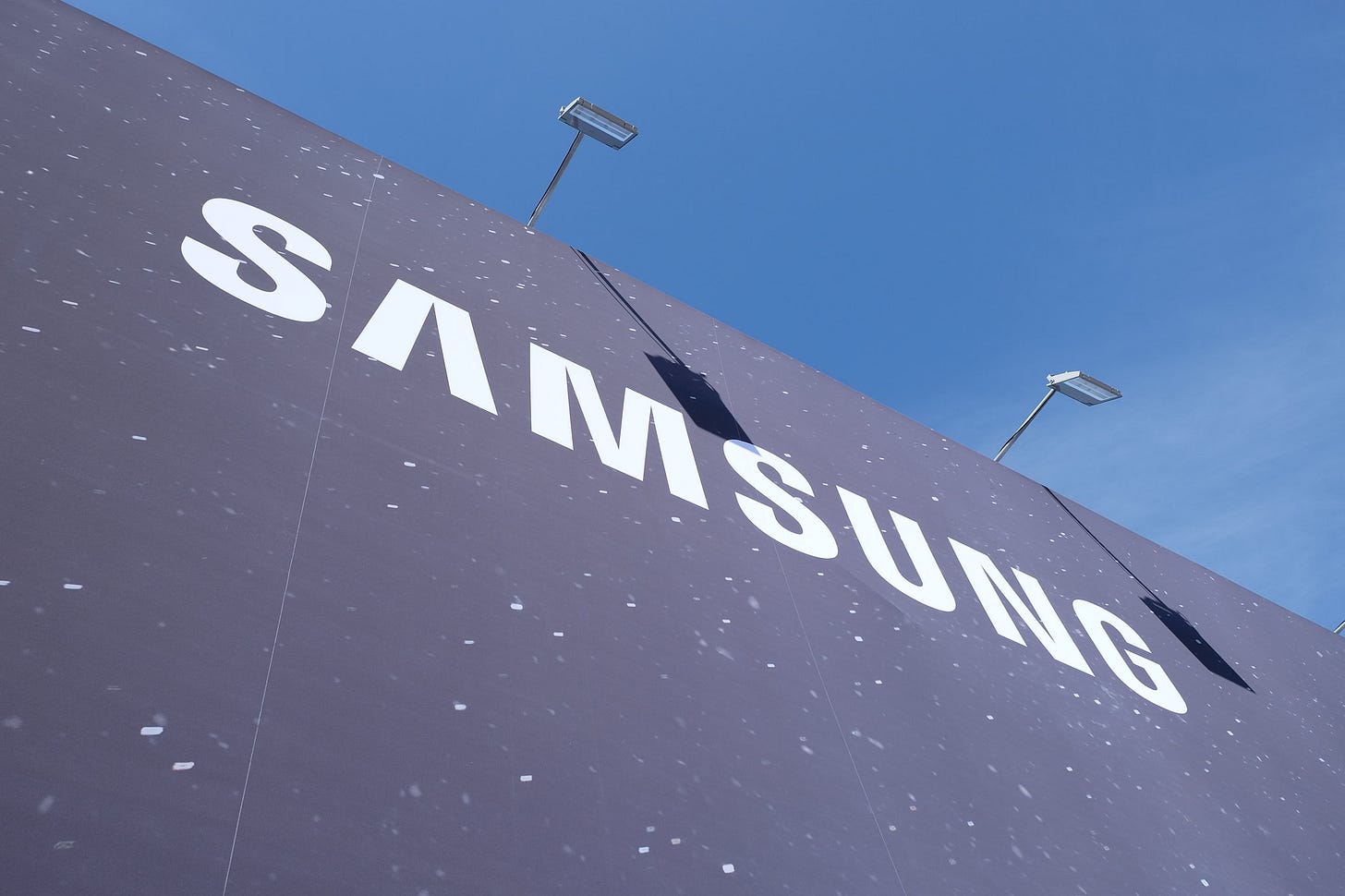
This is Boondoggle, the newsletter about corporations ripping off our states and cities. If you’re not currently a subscriber, please click the green button below to sign up. Thanks!
I know my last issue was about Texas, but events have compelled me to make a quick return to the Lone Star State. Samsung, the South Korean conglomerate, is looking to extort a truly massive giveaway package for a new semiconductor plant in Austin — or maybe in Phoenix, Arizona, or Western New York, depending on which report is to be believed.
It’s early in the process, and many details are under wraps, but at this point, Samsung’s gambit looks like a classic example of trying to get a boatload of taxpayer cash to do what it wanted to do anyway.
Samsung is reportedly going to invest some $17 billon in this new plant, which is a lot. According to Austin’s Community Impact Newspaper, in return for spending that princely sum, Samsung is seeking the complete and total elimination of its property taxes for 25 years, as well as more tax breaks from Travis County, in which Austin sits.
Let’s go over that again: No property taxes at all for a quarter-century.
Samsung rejected an offer of $650 million in giveaways from the city already — so it’s apparently reaching for Amazon HQ2 levels of taxpayer largesse, a deal to dwarf most other deals.
But here’s the thing: Samsung has made several moves indicating it is going to expand in Austin with or without a new incentive package. It bought new land, requested zoning changes, and asked the city for permission to relocate a road. Samsung already has a big facility in Austin — heavily subsidized by taxpayers — so it would make sense to add on to that infrastructure, rather than start from scratch somewhere else. Austin also has several other benefits, including an existing high-tech labor force, that make the city attractive for reasons having nothing to do with tax breaks.
But of course Samsung wants to generate the appearance of a bidding war in order to gin up taxpayer-funded giveaways, so it’s talking up alternative locations in and around Phoenix — where the Taiwanese company TSMC is also building a publicly-subsidized semiconductor plant — and Genesee County, New York. Senate Majority Leader Chuck Schumer, D-N.Y, is pushing for that latter location. Both New York and Arizona are bringing incentives to the table, they claim.
And look, maybe Samsung is serious about putting the plant somewhere other than Austin. But Austin lawmakers should be skeptical, given the moves the company has made, especially if Samsung is seeking an incentive package on the order of close to $1 billion. Texas has already given $317 million to Samsung, and that doesn’t take into account a bunch of undisclosed subsidies. That’s a serious amount of cash for one corporation in one state, and yet it keeps asking for more and more. Austin isn’t a company town, and there’s no need to make it one.
Now, there is another wrinkle to this story: Some level of public support for semiconductor companies is probably justified. Semiconductors are really important; they go into loads of products that make modern life possible. But the U.S. currently relies far too much on other countries for critical inputs and manufacturing.
The U.S.’s main semiconductor firm, Intel, meanwhile, is a mess. Like so many big, storied U.S. companies, it went from being an innovative manufacturer to a financialized outsourcer more concerned with boosting dividends than making good products.
So there’s a case to be made that ensuring the existence of a domestic semiconductor industry is a national security issue, as relying on Taiwan, China, and South Korea for a critical product is a recipe for disaster. But that support shouldn’t come in the form of states and cities engaging in a race to the bottom over one individual factory: It should come from the federal government, and not via bailouts for the big existing firms, but via introducing actual competition into the space.
Ensuring a steady supply of critical goods should be a collective responsibility fostered by the national government, and by all of us, together, not constructed piecemeal courtesy of local taxpayers shouldering the load for everyone else. As a warning, the aforementioned Intel has a habit of taking subsidies for job creation and then cutting jobs anyway.
Wherever Samsung lands, local leaders are going to make a lot of noise about “winning” the competition to have it in their community. But they’ll really just be victims of a shakedown.
UPDATE: When I talked with Florida State Rep. Anna Eskamani last year, she mentioned a tax credit program that is meant to help “high-crime” urban areas, but mostly benefits Universal Studios and Walmart. Eskamani has now introduced a bill to repeal it. Sounds about right.


ONE MORE THING: This isn’t very important in the grand scheme of things, but Amazon released some mock-ups showing what its HQ2 building in Northern Virginia is going to look like — the one that received some $750 million in state and local giveaways — and, it, ummm, well, you see…
Thanks for reading this edition of Boondoggle. If you liked it, please take a moment to click the little heart under the headline or below. And forward it around to friends, family, or neighbors using the green buttons. Every click and share really helps.
If you don’t subscribe already and you’d like to sign up, just click below.
Finally, if you’d like to pick up a copy of my book, The Billionaire Boondoggle: How Our Politicians Let Corporations and Bigwigs Steal Our Money and Jobs, go here.
Thanks again!
— Pat Garofalo





